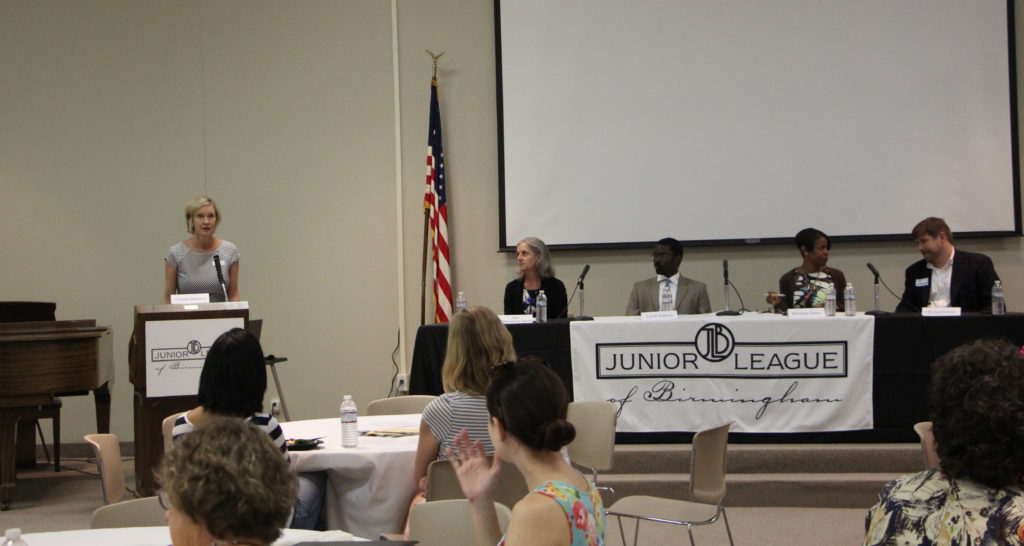Alabama mayors join Jr League Birmingham to fight human trafficking

Mayors all over Alabama are stepping up to fight human trafficking. Julia Meyers, Junior League Birmingham (JLB) chairwoman of the Anti-human Trafficking Committee, has been working tirelessly with the state legislative Human Trafficking Task Force in order to get regional government officials to proclaim January human trafficking awareness month. Mayors of Mountain Brook, Homewood, Vestavia Hills, and Hoover have all signed proclamations. “I reached out to 18 mayors in Jefferson County and immediately Over the Mountain mayors responded,” Meyers told the Over the Mountain Journal. “That, for me, was very exciting. In the areas where we think this problem isn’t going on, they are actually taking action.” “I’d like our city to know that Vestavia Hills Police Department actively participates in a task force with some of my old colleagues from my FBI days in addressing this issue,” said Vestavia Hills mayor, Ashley Curry. “We’re doing what we can and just ask that everybody look out for certain signs … if you see something that you don’t think is right, give us a call.” The city of Cullman, Ala. has also stepped up to the task with Mayor Woody Jacobs not only proclaiming January as human trafficking awareness month, but establishing January 11 as a Human Trafficking Awareness Day. “Human trafficking is a problem everywhere, even here in our community. I greatly respect the work that the Task Force has done and continues to do to help prevent this terrible crime in Cullman and Cullman County.” Newly elected Birmingham Mayor Randall Woodfin also joined Meyers in declaring January as human trafficking awareness month, as evidenced in this tweet by the Junior League of Birmingham: Junior League of Birmingham(JLB) President, Katy Roe Eldridge, and JLB Anti-Human Trafficking Chair, Julia Meyers, join Mayor Randall Woodfin as he and City Council proclaim January as “Human Trafficking Awareness Month”. Thank you for supporting JLB in this effort! pic.twitter.com/bBRq1GvkG2 — Jr. League of Bham (@JLBirmingham) January 10, 2018 “Junior League of Birmingham(JLB) President, Katy Roe Eldridge, and JLB Anti-Human Trafficking Chair, Julia Meyers, join Mayor Randall Woodfin as he and City Council proclaim January as “Human Trafficking Awareness Month”. Thank you for supporting JLB in this effort!” Birmingham is an important participant in human trafficking awareness month because of it’s closeness to the issue. Interstate I-20 between Atlanta and Birmingham is known as the Sex Trafficking Superhighway. “It cuts right there through downtown Birmingham, and what we’re finding, unfortunately with the interstate system that you and I use to get from Birmingham to Montgomery — is that people are using it to bring in girls, for example, for a short period of time. Buyers are available, and then they leave,” said David Pinkleton, fundraising chair for the Alabama Human Trafficking Task Force. Other Alabama officials have responded to the Task Force’s urges. Sen. Cam Ward introduced SB179 on Tuesday to increase the criminal punishment for those found guilty of obstruction or enforcement of current human trafficking laws. Gov. Kay Ivey is also expected to sign a proclamation later this month in observance of National Human Trafficking Awareness Month. In addition to the proclamations, Meyers is promoting the Rescue Innocence Project Gala, a fundraiser for the National Center on Sexual Exploitation. The event features guest speaker Ed Smart whose daughter was abducted in 2002 and miraculously returned to her family after nine grueling months. Smart and his daughter Elizabeth are now active voices in the fight against sexual exploitation. Although Alabama has it’s own human trafficking task force, new laws to punish those who would sexually exploit children, and lawmakers who are willing to step up and make a difference; Alabama only scores an 83.5 on the Shared Hope International report card. According to the report; “A juvenile sex trafficking victim will be identified as dependent or as a child in need of supervision rather than as delinquent, but Alabama law does not provide a statutory avenue to specialized services.” Under the Safe Harbor law, which passed in Alabama in 2016, minors who are arrested for prostitution are not sent to juvenile detention centers or convicted of prostitution. But therein lies the problem; the state of Alabama has no where else to put them. Minors are currently sent back into the situations that sent them there in the first place, or turned over to DHR. “They were denied education and have no skills. They don’t even have family to turn to.” Meyers told the Over the Mountain Journal. This is a problem Meyers and the National Center on Sexual Exploitation hopes to solve. By providing training, specialized staff, and intake facilities for minors who are victims of human trafficking; Alabama would finally have somewhere to send victims in desperate need of care. Funds collected from the Gala will go towards providing these facilities in Alabama and states around the nation.
Jr League of Birmingham hosts engaging and informative roundtable series

For nearly 100 years, the Junior League of Birmingham (JLB) has been a source of constant support in the Magic City. Dating back to 1922, the now-2,500-member League has actively supplied volunteers to some of the city’s greatest needs. From volunteering during the throes of the Great Depression and World Wars, to pioneering community projects, to proffering annual community endowments — the League has played a part in it all. Staying ever true to its mission of “improving the community through the effective action and leadership of trained volunteers,” the League continues to give back to the Birmingham community. This League year, JLB has hosted a series of community roundtables on important issues that matter to Alabamians — a possible Alabama lottery, legislative issues including Medicaid, predatory lending, prison reform, as well as race relations. The League took on the topic of race relations back in August, following a Pew Research Center report on the state of race relations in America. For JLB leaders, the report served as a stark reminder that the issue of racial inequality is just as urgent as ever. They hosted the event as a way to hear from community leaders to discuss racial matters affecting the community and ways to heal. “Discussion of police interactions with minority communities; institutions and interpersonal racism; and ‘safe spaces’ are dominating popular literature, film, television, talk shows and newspaper column inches. It seems everyone, everywhere, is talking about race in some capacity. The issue of racial inequality is truly not a trendy issue; it is an entrenched issue,” said a JLB press release. The roundtable, which was open to the public, featured panelists Joan Witherspoon-Norris, director of social justice at the YWCA; Lyord Watson, a preacher and philanthropist; Marquita Furness Davis, executive director for the Jefferson County Committee for Economic Development (JCCEO); and Hill Carmichael, the director of Urban Ministry. When moderator Crystal Maxena asked the first question, “Do we need to have conversations about race in Birmingham?” It was Witherspoon-Norris’ response that set the tone of the day, “So many of us are emotionally charged about race. Racism is so insidious that sometimes it’s hard to know what it is.” “There are so many indicators that racism is alive and well,” Witherspoon-Norris continued. “The systems that run our society – banking, predatory lending, education, criminal justice – every indicator says that racism is thriving. If we want to fix that so that people have a fair shot, regardless of that race, we definitely need to talk about it.” Alabama Today publisher Apryl Marie Fogel attended the event and said, “What struck me most about the event was the diversity of the panel and the audience; this contributed to a lively and informative conversation. The Junior League of Birmingham did a great job of hosting an engaging panel and of reaching out within the community to encourage a broad range of attendees each of whom pledged their support to improving race relations within our city.” Little over a month later, JLB hosted another roundtable on the hot-topic issue of a possible state lottery. There, the JLB encouraged leaders from across the state to discuss the current legislation in Montgomery surrounding the lottery and how it would effect our state and the local economy. Panelist included Joe Godfrey, Executive Director, Alabama Citizens Action Program; Nat Winn, Jr., President and CEO, Greenetrack; as well as Stephanie Bryan, Tribal Chair and CEO for the Poarch Creek Band of Indians. JLB chose to tackle the topic immediately after a proposed constitutional amendment to allow a lottery in the state of Alabama died in late August in the state Senate. Gov. Robert Bentley had proposed the lottery to help fund the state’s budget shortfall. Earlier this month, the League held its third roundtable of the “League year,” which annually spans from June-May, where they took a look at issues being discussed in the current legislative session of the Alabama Legislature including Medicaid, predatory lending and prison reform. Guin Robinson, Director of Community Outreach, Jefferson Community College, moderated the panel and discussion, which featured several members of the state legislature including state Reps. David Faulkner, Connie Rowe, Rod Scott, Rodger Smitherman and Jabo Waggoner. This particular roundtable, open to the public, became heated as voters starting shouting at the panel over the fact the Legislature has not raised the state’s minimum wage as well as Gov. Robert Bentley‘s prison construction plan. Fogel said, “I believe there’s a perception when it comes to the junior league that it’s just a social organization but what I’ve learned from the outreach and hosting of these events is that first and foremost this is a group women invested in making our city and the surrounding area stronger, safer and better.”


